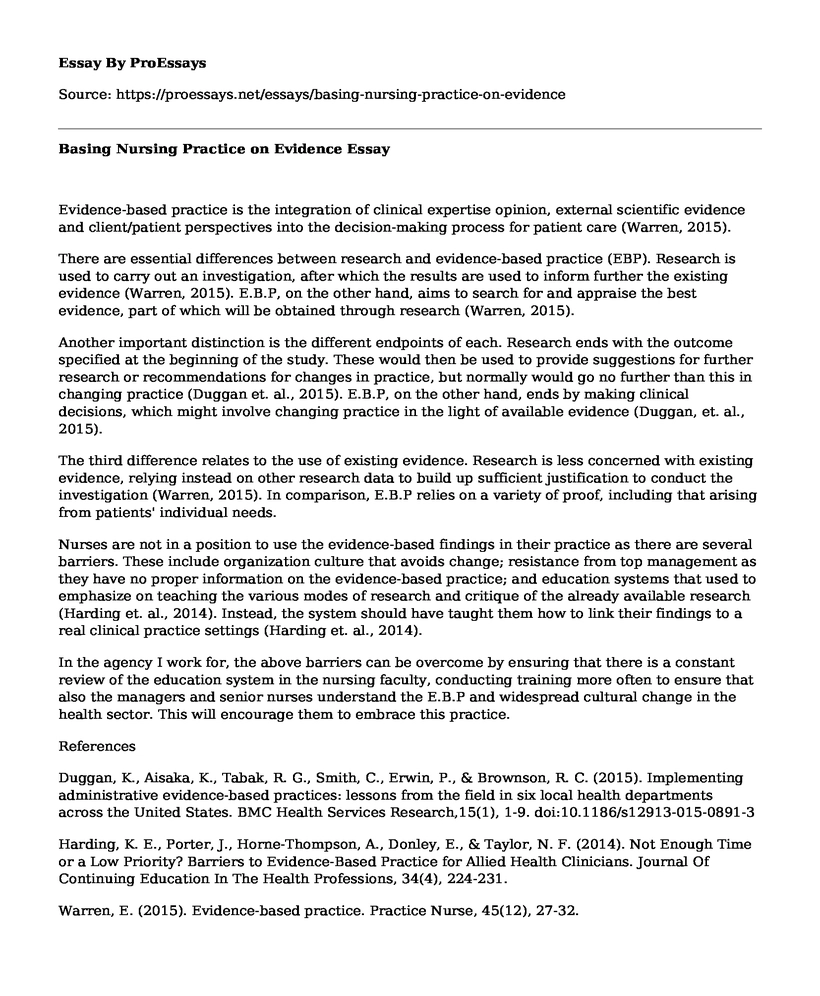Evidence-based practice is the integration of clinical expertise opinion, external scientific evidence and client/patient perspectives into the decision-making process for patient care (Warren, 2015).
There are essential differences between research and evidence-based practice (EBP). Research is used to carry out an investigation, after which the results are used to inform further the existing evidence (Warren, 2015). E.B.P, on the other hand, aims to search for and appraise the best evidence, part of which will be obtained through research (Warren, 2015).
Another important distinction is the different endpoints of each. Research ends with the outcome specified at the beginning of the study. These would then be used to provide suggestions for further research or recommendations for changes in practice, but normally would go no further than this in changing practice (Duggan et. al., 2015). E.B.P, on the other hand, ends by making clinical decisions, which might involve changing practice in the light of available evidence (Duggan, et. al., 2015).
The third difference relates to the use of existing evidence. Research is less concerned with existing evidence, relying instead on other research data to build up sufficient justification to conduct the investigation (Warren, 2015). In comparison, E.B.P relies on a variety of proof, including that arising from patients' individual needs.
Nurses are not in a position to use the evidence-based findings in their practice as there are several barriers. These include organization culture that avoids change; resistance from top management as they have no proper information on the evidence-based practice; and education systems that used to emphasize on teaching the various modes of research and critique of the already available research (Harding et. al., 2014). Instead, the system should have taught them how to link their findings to a real clinical practice settings (Harding et. al., 2014).
In the agency I work for, the above barriers can be overcome by ensuring that there is a constant review of the education system in the nursing faculty, conducting training more often to ensure that also the managers and senior nurses understand the E.B.P and widespread cultural change in the health sector. This will encourage them to embrace this practice.
References
Duggan, K., Aisaka, K., Tabak, R. G., Smith, C., Erwin, P., & Brownson, R. C. (2015). Implementing administrative evidence-based practices: lessons from the field in six local health departments across the United States. BMC Health Services Research,15(1), 1-9. doi:10.1186/s12913-015-0891-3
Harding, K. E., Porter, J., Horne-Thompson, A., Donley, E., & Taylor, N. F. (2014). Not Enough Time or a Low Priority? Barriers to Evidence-Based Practice for Allied Health Clinicians. Journal Of Continuing Education In The Health Professions, 34(4), 224-231.
Warren, E. (2015). Evidence-based practice. Practice Nurse, 45(12), 27-32.
Cite this page
Basing Nursing Practice on Evidence. (2021, Mar 13). Retrieved from https://proessays.net/essays/basing-nursing-practice-on-evidence
If you are the original author of this essay and no longer wish to have it published on the ProEssays website, please click below to request its removal:
- High Levels of Curative Health Expenditures
- Management Essay Example: Phases in Implementing Change
- Care Management in Nursing Practice Paper Example
- Holistic Care of Dementia Patients: Nursing Staff's Competencies and Challenges - Research Paper
- Essay Sample on Vasectomy: Making the Difficult Decision of Permanent Sterilization
- Essay Example on Becoming a Family Nurse Practitioner: My Journey to Serve
- US 2020 Elections - Essay Example







